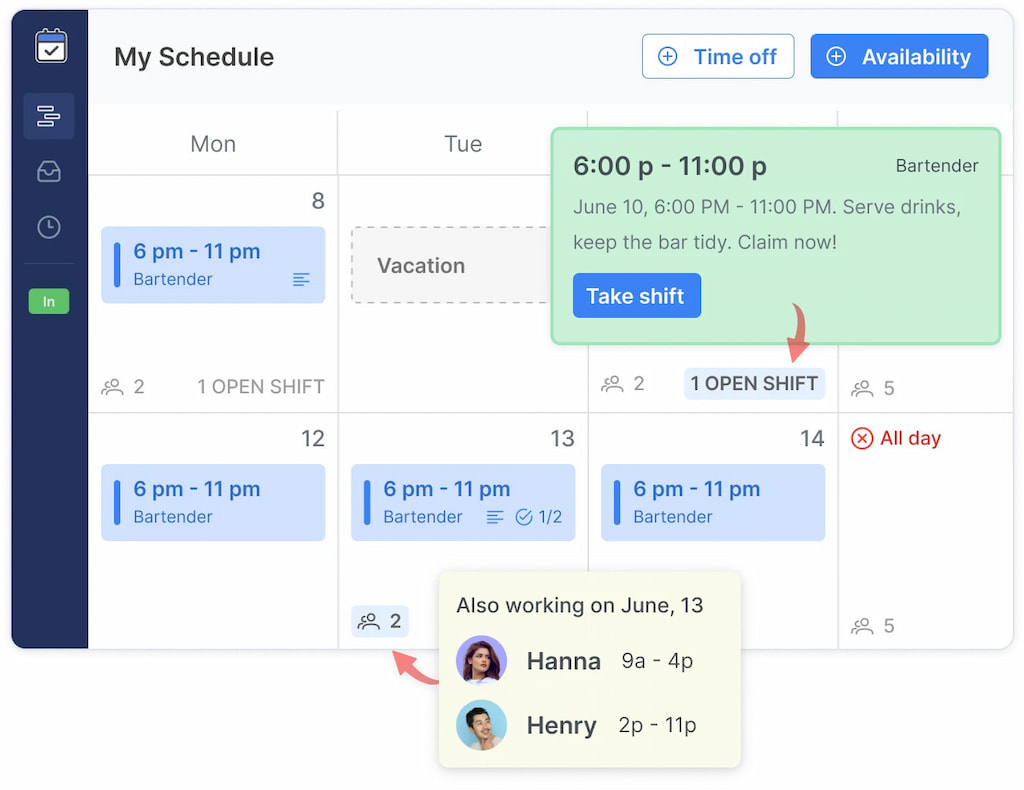A scheduling conflict occurs when two or more events, meetings, or responsibilities are planned for the same time and can’t be completed simultaneously. It’s one of the most common issues in both professional and personal calendars—but the way you handle it can either build trust or erode it.
Let’s walk through:
- What “scheduling conflict” actually means
- Common workplace and personal examples
- Best practices to resolve conflicts professionally
- Email templates and polite decline examples
- Best scheduling tools and strategies to avoid them
- Industry-specific considerations
- Real-world applications and case studies
- Frequently asked questions
📆 What Is a Scheduling Conflict?
A scheduling conflict occurs when a person or team is double-booked or unable to attend a commitment due to overlapping appointments, work shifts, or unexpected obligations.
⚠️ Conflicts typically happen due to:
- 🔍 Poor visibility of availability
- ✍️ Manual scheduling errors
- 📥 Unanticipated tasks or meetings
- 🔗 Inefficient calendar coordination across teams
🚧 In work environments, scheduling conflicts can lead to missed deadlines, overworked staff, or even client churn. In personal life, they often result in frustration or missed opportunities.
💼 Industry insight: In shift-based industries like hospitality or healthcare, a single scheduling conflict can derail service delivery and lead to costly overtime.
📍 Real-world scenario: Imagine a maintenance company sends two technicians to the same address while another job site remains unstaffed due to an overlooked overlap. The result? Client dissatisfaction, wasted hours, and poor coordination.
📚 Scheduling Conflict Examples
Here are some common examples of scheduling problems and conflicts:
👷♂️ 1. Employee scheduling conflicts
- 🔧 A technician is booked for two service jobs at overlapping times.
- 🏖️ A nurse is assigned to a shift but already has approved PTO.
- 📊 A manager is double-booked for two leadership meetings.
📅 2. Meeting scheduling conflicts
- 💻 A team member accepts two Zoom calls for the same afternoon.
- 🌐 A stakeholder invites a client to a pitch call during a national holiday.
- 🔁 Two recurring meetings unintentionally overlap.
🏡 3. Personal life conflicts
- 💒 You RSVP yes to two weddings on the same day.
- 📆 You commit to a conference but forget about a family obligation.
🧠 Extended insight: When multiplied across entire teams or service organizations, scheduling conflicts compound exponentially. This is especially problematic in industries like logistics, field services, and customer support.
🔎 Example: A field technician with five jobs scheduled in different zones ends up missing two due to a system that didn’t factor in travel time or breaks.
⚠️ What Causes Scheduling Conflicts?
The main causes include:
- 📆 Lack of a shared calendar
- 🏖️ PTO or sick leave not synced with availability
- 📊 Manual or spreadsheet-based scheduling
- 🧩 Lack of communication between departments
- 🚨 Surprise events (emergencies, customer escalation, etc.)
💡 Pro tip: Many organizations now use software that proactively detects and warns of potential conflicts. These systems can reduce conflict incidents by up to 40%.
📈 Case example: After adopting conflict-aware scheduling tools, a mid-sized dental chain reported 35% fewer cancellations due to staff double-booking.
🧭 Professional Ways to Handle Scheduling Conflicts
When you run into a conflict, don’t panic or ghost the meeting.
Here’s what to do:
- ⏰ Respond early – the sooner you flag it, the easier it is to reassign or reschedule.
- 🔁 Offer an alternative – suggest a new time, date, or delegate a colleague.
- 🙋 Be honest but polite – especially when declining an invite.
- 📝 Keep it short and professional – don’t over-explain.
- 🤖 Use a scheduling assistant – tools like Calendly or Shifts by Everhour can offer open times automatically.

- 📆 Set calendar buffers – build in 15–30 minute windows to reduce spillover.
📧 Polite Email Responses to Scheduling Conflicts
📅 1. Reschedule a meeting due to a conflict
Subject: Meeting Reschedule Request
Hi [Name], unfortunately I have a scheduling conflict at that time. Would [new date/time] work for you instead? Apologies for the overlap and thanks for your understanding.
🙅 2. Decline an invite due to scheduling conflict
Subject: Unable to Attend Due to Prior Commitment
Hi [Name], thanks so much for the invite. I’m unable to attend due to a prior commitment at that time. Please keep me updated on any key outcomes.
⚠️ 3. Last-minute cancellation
Subject: Apologies for Last-Minute Conflict
Hi [Name], I’m so sorry for the short notice, but something urgent has come up and I’ll have to miss today’s session. Can we reschedule?
🔄 4. Reassigning due to conflict
Subject: [Colleague] Will Attend in My Place
Hi [Name], I’m unable to attend due to a scheduling conflict, but [Colleague] will join instead and is fully briefed.
📝 Note: Always send a follow-up or a calendar update to avoid confusion.
🛠️ Tools That Help Avoid Scheduling Conflicts
| 🧰 Tool Type | 📌 Examples | 💡 Why It Helps |
|---|---|---|
| 📅 Shared calendars | Google Calendar, Outlook | Avoid double bookings and see team availability |
| 🗓️ Scheduling software | Shifts by Everhour, Calendly | Auto-checks availability before confirming |
| 👥 Employee shift planners | When I Work, Deputy, Homebase | Prevents shift overlaps and PTO clashes |
| ⚠️ Conflict alerts & syncing | Everhour, Microsoft Teams | Warns of overlaps before confirming invites |
📉 Real-world benefit: Companies that implemented scheduling automation reported a 25% decrease in labor cost due to better coverage and fewer overlaps.
📲 Add-on tools: Integrations with Slack, MS Teams, or mobile apps can push alerts in real time when a scheduling issue is detected.
🌍 Industry-Specific Considerations
🩺 Healthcare
- Double-booking nurses can risk patient safety and compliance violations.
- Tools like shift planning with fatigue tracking are critical.
- HIPAA-compliant scheduling tools are a must.
🔧 Field services
- Missing job windows due to schedule conflicts can result in revenue loss.
- Mobile-friendly scheduling tools with real-time updates are key.
- Use route optimization to prevent time-based conflicts.
🎯 Marketing agencies
- Conflicting client calls and internal deadlines can bottleneck execution.
- Use visual project timelines that sync with calendars.
- Color-coded workload indicators help prevent burnout.
❓ FAQ: Scheduling Conflict Questions Answered
What is another word for scheduling conflict?
Time clash, calendar conflict, double booking, overlap, appointment conflict.
How do you professionally decline a meeting due to a scheduling conflict?
Be brief and honest: “Unfortunately, I have a scheduling conflict and won’t be able to attend.“
How do I prevent scheduling conflicts in my team?
Use shared calendars, enforce PTO tracking, and avoid manual scheduling. Consider using software that alerts for overlaps.
Can a scheduling conflict mean something positive?
In rare cases, yes. It could reflect strong demand on your time—but it’s still a signal to improve prioritization.
What if I’m double-booked and both meetings are important?
Prioritize based on impact. If both are critical, reschedule one and propose async updates for the other.
What is a good subject line for a reschedule email?
“Request to Reschedule Meeting,” “Meeting Conflict – New Time Suggestion,” or “Change in Meeting Schedule.”
What if I repeatedly get conflicts in my calendar?
It’s a sign your system or team process needs improvement. Introduce central scheduling tools and set stronger calendar hygiene protocols.
Can employee scheduling software handle conflicts?
Yes. Advanced tools like Shifts by Everhour and Deputy include built-in conflict detection, fatigue alerts, and auto-suggestions for coverage.
Need help eliminating scheduling conflicts? Start with a shared tool that shows real-time availability and sends alerts before overlaps happen. Fewer surprises = better outcomes.
👉 Try Shifts by Everhour to coordinate shift-based teams without conflict.
▶ Find out the difference between staffing and scheduling in our guide!

